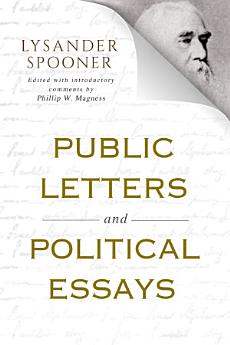Public Letters and Political Essays
Kuhusu kitabu pepe hiki
Containing over 40 years of newspaper editorials as well as the complete set of Spooner’s contributions to the magazine Liberty, many of these essays have been out of print for over a century. For any fan of Spooner’s political philosophy, and the idea of human liberty generally, this collection is essential reading.
The American Institute for Economic Research in Great Barrington, Massachusetts, was founded in 1933 as the first independent voice for sound economics in the United States. Today it publishes ongoing research, hosts educational programs, publishes books, sponsors interns and scholars, and is home to the world-renowned Bastiat Society and the highly respected Sound Money Project. The American Institute for Economic Research is a 501c3 public charity.
Kuhusu mwandishi
Lysander Spooner (1808-1887) is primarily remembered today as a sharp-witted legal theorist who penned a number of influential attacks on the institution of slavery in the decades preceding the American Civil War. An uncompromising logician, his preferred means of argument entailed taking an agreeable premise—usually from the common law or observed convention—and methodically developing it to an unwavering extreme, intended to tease out uncomfortable truths it revealed about societal hypocrisies and injustices. He was a self-professed enemy of political authority, although he operated within its own turf of the legal system. His most famous works in his lifetime deployed the U.S. Constitution against its own most notorious clauses, effectively arguing that the continued tolerance of slavery under constitutional auspices would render the document—and the government based upon it—void. After the Civil War he extended this reasoning to the concept of government more generally, using strict legal literalism to cast doubt upon the social contractarianism and any constitution that ostensibly rested upon its assumptions.
Phil Magness is a political and economic historian of the "long" 19th century U.S. (1787-1920). His work aims to foster our understanding what Tocqueville and Bastiat described as two of the main policy problems in early American government: Slavery and Tariffs. Magness' interest in abolitionism encompasses the works of the anti-slavery constitutionalist faction of Gerrit Smith and Lysander Spooner, as well as the little-studied yet historically important black pamphleteer & man of letters John Willis Menard. He is also a specialist in the history of the colonization movement and related attempts to resettle freed slaves abroad, particularly during the Civil War and Abraham Lincoln's presidency. His work on trade and tax policy examines the tariff as a problem of political economy in the 19th century U.S., and covers the founding era through the adoption of the Income Tax in 1913 when tariffs ceased to be used as a primary revenue-generating policy.






